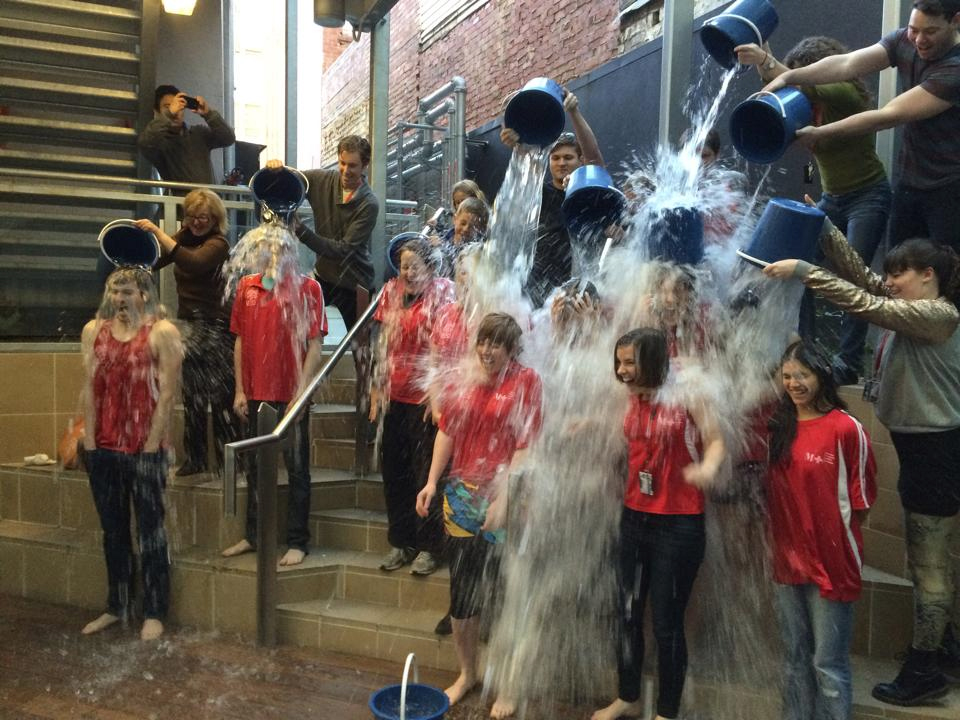How the Ice Bucket Challenge Swept the World
Published: August 2019
Five years ago, Pete Frates, Pat Quinn and Anthony Senerchia, Jr., all living with MND, started a movement that forever changed how we understand, and potentially treat, this devastating disease.
The Ice Bucket Challenge was clever, and infectious.
After going viral across social media in July and August 2014, the challenge saw people across the world dump icy water on themselves, film it, donate to ALS/MND associations and encourage others to do the same.
More than 17 million people shared their videos online. By the middle of 2014, an estimated $220 million was donated worldwide for ALS/MND, all from one fund raising effort.
The money raised was critical in speeding up vital research in Australia and across the world, leading to increased understanding, discoveries in genetics, and more potential new treatments being developed for clinical trial.
Five years on, Senerchia has sadly died whilst Frates, Quinn and others living with MND are still fighting a race against time. Even with the incredible momentum of the Ice Bucket Challenge, the journey to stop MND is a long one. And daily life only gets harder for those with the disease.
Research to stop MND in Australia and across the globe
One of the greatest things about the Ice Bucket Challenge is that it helped bring together and support researchers from around the world.
In Australia, through the MND Australia Ice Bucket Challenge Project Grant, Professor Naomi Wray from the University of Queensland, and Professor Ian Blair fron Macquarie University, are leading a national consortium of clinicians, scientists and people living with MND.
Importantly, the consortium’s research has developed new ways of collecting clinical information and biological samples. So far, over 600 people with MND have contributed blood samples and other information, helping to build a picture of the varied and diverse nature of MND.
Due to Australian work, research that was once impossible can now draw on rich data to better understand the clinical, genetic, lifestyle and other factors shaping the disease, and help with efforts in its treatment, both here and overseas.
Much further north, Canadian research received an “unprecedented” amount of funding as a result of the Ice Bucket Challenge, and is committed to work showing the most promise for slowing down or stopping the disease.
Research includes projects to determine if MND can be slowed through testing of a drug called pimozide, whether eye muscles and their resistance to MND can shed light on preserving the function of other muscles in the body, and if there’s a link between MND and viral infections.
A first for Canada, their research initiative aims to keep taking great leaps in understanding how to stop MND.
More broadly, Project MinE is an international collaboration that is trying to collect and analyze genetic data from at least 15,000 patients with MND and 7500 control subjects to help identify the genetic basis for the disease.
Funding from the Ice Bucket Challenge in 2014 accelerated global involvement, with over 80 researchers from various countries, including Australia, the Netherlands, the US, Italy, UK, Germany, Spain, Turkey and others, now working together through Project MinE discovering more and more MND-related genes.
And other research and related activities have had a positive effect on understanding and trying to slow MND, like the study of proteins involved in the disease, new clinical trials and medicine programs, the development of assistive technology and increasing access to care and services
Of course, recent advances in research are part of a long-term game. The future remains challenging for finding better ways to treat MND – but with such incredible investments like those made through the Ice Bucket Challenge, on a global scale, the future is a much brighter one and there is now real hope that we are closer than ever before to stopping MND in its tracks.
How you can help speed up research
The Ice Bucket Challenge showed how quickly people across the world can take action together, and fund research that makes a difference to how we understand and develop potential treatments for MND.
While the funding of high quality, scientific research provided hope for so many people, its steady progress has taken time and needs continued investment. The problem is that Frates, Quinn and so many other people living with MND don’t have time on their side because of the progressive and rapid nature of the disease.
The good news is we don’t have to wait to help speed up the breakthroughs. Or let people living with MND face such a terrible disease on their own.
Your donation to research can help keep the Ice Bucket Challenge making waves across the world for MND, and help make sure time isn’t being wasted.
More information
The Sporadic ALS Australian Systems Genomics Consortium - Final Report (MND Australia Ice Bucket Challenge Grant 2015-2019)



